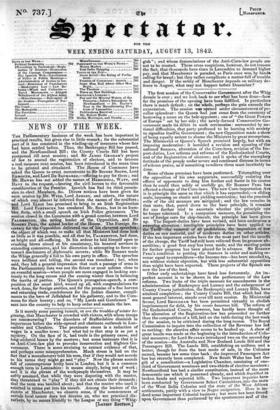NEWS OF THE WEEK.
THE Parliamentary business of the week has been important in practical results, but gives rise to little remark; for the substantial part of it has consisted in the winding-up of measures whose fate bad been settled before. Thus, the Bankruptcy Bill has passed, and the Newfoundland Bill ; the County Courts Bill has been postponed till next session ; and Sir JAMES GRAHAM'S project of law to amend the registration of electors, and to become a real measure next session, has been introduced in the mean time to be printed and circulated. The House of Commons have asked the Queen to erect monuments to Sir SIDNEY Surrn, Lord EXSIOUTIY, and Lord Da SAUMAREZ,—offering to pay for them ; and Mr. Havess has not added the names of Minimum., WATT, and DAVY to the request,—leaving the civil heroes to the favourable consideration of the Premier. Ipswich has had its third permis- sion to elect Members *c. Divers notices have been given for next session by Mr. WYSE, Lord ASHLEY, and others, the nature of which may almost be inferred from the names of the notifiers ; and Lord Emor has promised to bring in an Irish Registration Bill, Lord FORTESCIIE has emulated Mr. SHELL, but in an hum- bler form, with a small speech on Irish Police grievances. The session closed in the Commons with a grand combat between Lord Parausasrox, the ayting leader of the Opposition, and Sir Roamer PEEL, the actual leader of the House. The Foreign Se- cretary for the'Opposition delivered one of his cleverest speedup.; the object of which was to make all that Ministers 'bad done look as little as it was possible, and all that he, PALMERSTON, had done, as bright and all-sufficing. In his ardour he laid himself open to crushing blows aimed at his consistency, his boasted' services in extending commerce, and his discretion in attempting to force un- toward disclosures of,diplomatic secrets; while Sir ROBERT made the Whigs generally a foil to his own party in office. The speeches were brilliant and telling, the second was trenchant ; but, when said, they left a general impression that such a passage of arms in the Parliamentary lists was not the fittest or most solemn close to an eventful session—when people are more engaged in looking anx- iously to the long recess and the coming winter than in balancing the merits of parties. The Queen's prorogation-speech, a com- position of the usual kind, wound up all, with congratulations for work done, for foreign amities, and for the promise of a fine harvest and returning trade, condolences for the Indian disaster, compli- ments to the hero of Jellalabad for his gallantry, and to the Com- mons for their bounty ; and so, "My Lords and Gentlemen" are sent into the country to help to keep order and sustain the law.


























